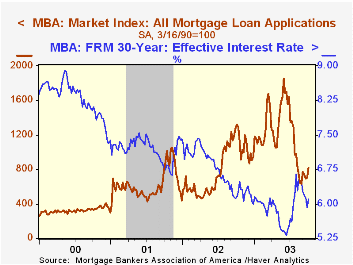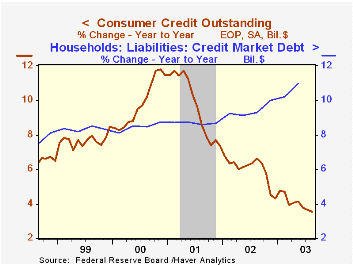 Global| Oct 08 2003
Global| Oct 08 2003Despite Higher Rates Mortgage Applications Rose
by:Tom Moeller
|in:Economy in Brief
Summary
The index of mortgage applications compiled by the Mortgage Bankers Association rose 15.6% last week to the highest level since early August. The rise came despite a slight increase in interest rates. Interest rates on a conventional [...]

The index of mortgage applications compiled by the Mortgage Bankers Association rose 15.6% last week to the highest level since early August. The rise came despite a slight increase in interest rates.
Interest rates on a conventional 30-Year mortgage rose to 6.10%, up 18 basis points w/w. The effective rate on a 15-year mortgage rose to 5.47%. These recent increases in rates run counter to the rate declines reported by Freddie Mac.
Applications to refinance rose 19.9% w/w, also to the highest level since early August. Despite gains during the last two weeks, applications to refinance are down 70% from the weekly high in late May.
Purchase applications rose 10.8% w/w to the highest level since early August. For all of September the level of purchase applications rose 11.0% from a year ago but just 1.2% from August. The level in early October is up another 7.5% versus September.
During the last ten years there has been a 55% correlation between the y/y change in purchase applications and the change in new plus existing home sales.
The Mortgage Bankers Association surveys between 20 to 35 of the top lenders in the U.S. housing industry to derive its refinance, purchase and market indexes. The weekly survey accounts for more than 40% of all applications processed each week by mortgage lenders. Visit the Mortgage Bankers Association site here.
| MBA Mortgage Applications (3/16/90=100) | 10/03/03 | 9/26/03 | 2002 | 2001 | 2000 |
|---|---|---|---|---|---|
| Total Market Index | 817.3 | 707.2 | 799.7 | 625.6 | 322.7 |
| Purchase | 441.1 | 398.0 | 354.7 | 304.9 | 302.7 |
| Refinancing | 3,005.5 | 2,505.8 | 3,388.0 | 2,491.0 | 438.8 |
by Tom Moeller October 8, 2003

The Federal Reserve reported that consumer credit outstanding (which excludes mortgages) rose $8.2B (5.1% AR) in August. Consensus expectations had been for a $5.5B gain.
The Federal Reserve Board added student loans extended by the federal government and Sallie Mae to the Consumer Credit Outstanding figures (nonrevolving).This addition resulted in an average upward revision of 3% beginning in 1977 and an average upward revision of 0.4% to the growth rate each year.
During the first eight months of this year, consumer credit usage rose at a 4.8% annual rate. The more comprehensive flow of funds figures published by the Federal Reserve indicated that through 2Q03, credit market debt owed by the household sector surged 11.0% y/y. That gain was led by a 13.8% y/y gain in outstanding liabilities on homes.
Nonrevolving credit (which includes auto loans) rose at a 6.9% annual rate in august following a 5.5% gain in July. Year to date, nonrevolving credit usage is up at a 5.8% annual rate.
Revolving credit rose at a 2.0% annual rate in August following a 0.8% gain in July. Year to date, revolving credit usage is up at a 3.3% annual rate.
| Consumer Credit Outstanding | Aug m/m | July m/m | Y/Y | 2002 | 2001 | 2000 |
|---|---|---|---|---|---|---|
| Total | $8.2B | $6.2B | 3.5% | 4.3% | 7.3% | 11.5% |
| Revolving | $1.2B | $-0.2B | 1.0% | 1.5% | 5.1% | 11.6% |
| Nonrevolving | $7.0B | $6.4B | 5.1% | 6.4% | 8.8% | 11.4% |
Tom Moeller
AuthorMore in Author Profile »Prior to joining Haver Analytics in 2000, Mr. Moeller worked as the Economist at Chancellor Capital Management from 1985 to 1999. There, he developed comprehensive economic forecasts and interpreted economic data for equity and fixed income portfolio managers. Also at Chancellor, Mr. Moeller worked as an equity analyst and was responsible for researching and rating companies in the economically sensitive automobile and housing industries for investment in Chancellor’s equity portfolio. Prior to joining Chancellor, Mr. Moeller was an Economist at Citibank from 1979 to 1984. He also analyzed pricing behavior in the metals industry for the Council on Wage and Price Stability in Washington, D.C. In 1999, Mr. Moeller received the award for most accurate forecast from the Forecasters' Club of New York. From 1990 to 1992 he was President of the New York Association for Business Economists. Mr. Moeller earned an M.B.A. in Finance from Fordham University, where he graduated in 1987. He holds a Bachelor of Arts in Economics from George Washington University.
More Economy in Brief
 Global| Feb 05 2026
Global| Feb 05 2026Charts of the Week: Balanced Policy, Resilient Data and AI Narratives
by:Andrew Cates






